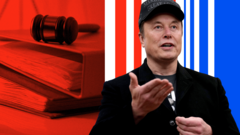Tasked with streamlining the federal workforce and reducing expenses, Musk's Doge is under scrutiny for its operational transparency and potential conflicts of interest, as it embarks on a controversial mission to reshape government efficiency.**
Musk’s Department of Government Efficiency: Aiming for Simplification or Overreach?**

Musk’s Department of Government Efficiency: Aiming for Simplification or Overreach?**
Elon Musk's newly formed Department of Government Efficiency (Doge), designed to cut U.S. government jobs and spending, faces challenges and controversies while garnering public support.**
Elon Musk, the world’s richest man, is steering a new initiative, the Department of Government Efficiency (Doge), under a recent executive order from former President Donald Trump. This advisory group has a bold mission: to drastically cut the federal workforce and improve government spending. Musk’s involvement has sparked debate, as he seeks to identify and eliminate perceived waste of taxpayer money. However, Doge’s operations have faced legal challenges, allegations of conflicts of interest, and concerns over its potential impact on government functions.
In a surprise appearance at the White House, Musk addressed reporters regarding the goals of Doge. He refuted claims from Democratic opponents that he is orchestrating a "hostile takeover" of governmental roles. According to polling data, there is significant public support for reducing government spending, indicating a national appetite for reform.
Contrary to what its name suggests, Doge is not an official government department, as such entities require congressional approval. Instead, it operates as a presidential advisory body with a focus on efficiency improvements in IT and plans to complete its objectives by July 2026. The personnel involved are generally younger individuals with backgrounds in technology, although its controversial recruitment practices have raised eyebrows, especially after the resignation of an employee linked to racist remarks.
Musk's status has also evolved; initially stating he would function in a volunteer position, the White House later classified him as an unpaid special government employee, allowing him limited time to work with the administration. Some supporters argue that this outsider perspective frees Doge from bureaucratic constraints, potentially enhancing its effectiveness in identifying public expenditure issues.
Doge's purported mission is noble: to save taxpayer dollars and lessen the national debt, which currently hovers around $36 trillion. Musk had originally claimed he could save $2 trillion annually but has recently moderated this estimate. He has called for an end to what he views as excessive bureaucracy impeding government efficiency, prompting skepticism regarding his ideology and approach to reform.
While the success of Doge’s initiatives remains uncertain, the agency has initiated several actions: examining agency budgets for overspending, purportedly identifying fraudulent expenditures, and cutting funding for diversity, equity, and inclusion programs, which Musk has branded as wasteful. Their controversial stance against USAID and efforts to increase workforce buyout offers to over two million federal employees are also notable.
Public reception appears divided along partisan lines; while many Americans, particularly Republican voters, endorse the initiative and believe Musk's influence should be limited, there is considerable opposition from political adversaries and government observers. Critics accuse Doge of operating without sufficient transparency and abusing its advisory role, particularly as Musk’s businesses hold extensive government contracts.
Legal challenges have emerged against Doge, with unions and state attorneys general contesting its authority and alleging violations of established funding practices. Despite court interventions aimed at curbing Doge's reach, Musk stands firm, asserting his vision for efficient governance aligns with the electorate’s desire for reform.
Experts express mixed feelings about Musk's ambitious goals. While some view the push for streamlined spending as viable, others deem Musk’s targets unrealistic, given the mandatory nature of significant portions of the federal budget, including Social Security and Medicare. The complexities surrounding Doge will likely continue to unfold as Musk’s controversial experiment in government efficiency progresses.



















